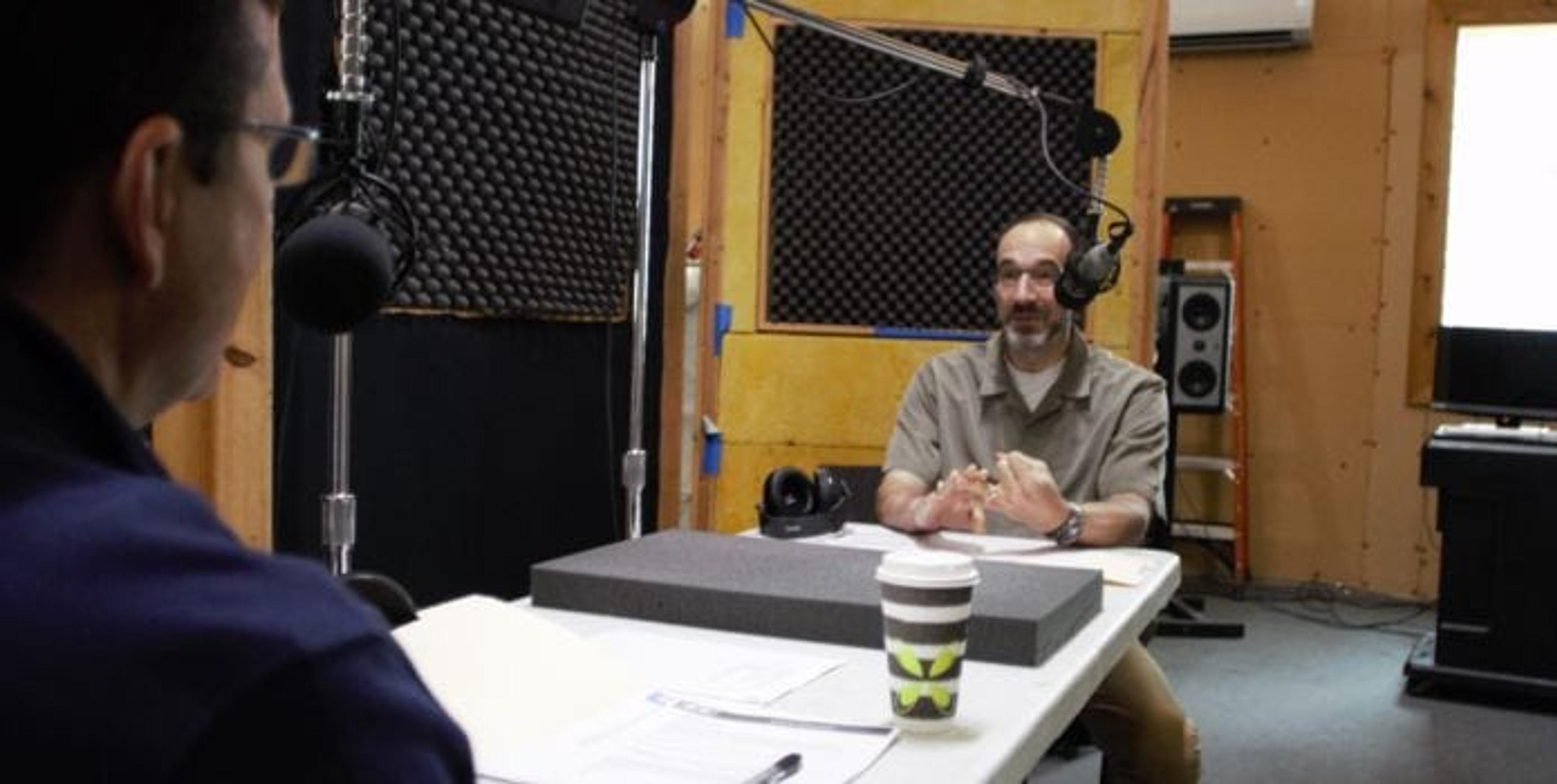Difference Between Stress and Anxiety
| 1 min read

00:00
00:00
About the Show
On this episode, Chuck Gaidica and Dr. Duane DiFranco discuss tips for tackling anxiety, depression and alcohol use disorder.
“It’s a chicken and an egg thing and these things feed off of one another. So much of our normal stress response is that way, and so much of these disorders is that way. Alcohol leads to depression, depression leads to alcohol, and you’re off to the races.”– Dr. Duane DiFranco
In this episode of A Healthier Michigan Podcast, we explore:
- What are the most common types of mental disorders?
- Using self-screening tools PHQ-9 and the Zung Self-Rating Anxiety Scale to identify symptoms of depression and anxiety, respectively.
- Unpacking alcohol use disorder and the 3-4-12 rule.
- How diet, exercise and sleep can combat stress.
- How positive psychology can improve both emotional and mental health.
Transcript
Chuck: This is A Healthier Michigan Podcast, episode 15. Coming up, we discuss the differences between stress, anxiety and other diagnosable conditions as well as some screening options.
Chuck: Welcome to A Healthier Michigan Podcast, the podcast dedicated to navigating how we can all improve our health and well-being just by making some small changes, turning those into habits as we heard from Dr. DiFranco, who’s with us today, just do something for three weeks and it becomes a good habit, maybe. I’m your host, Chuck Gaidica, each week we sit down with a certified health expert from Blue Cross Blue Shield of Michigan, and we look at things like nutrition, well-being, stress reduction.
Chuck: In this episode we’re talking about stress. We’ve been doing that for the past couple with Dr. Duane DiFranco. He’s board-certified psychiatrist, currently Senior Medical Director at Blue Care Network of Michigan. He’s a graduate of the University of Notre Dame, attended U of M and he’s got so many other things he does. A psychiatrist among them, and I tell you what, I am learning so much. I’m making notes and let me encourage everybody, if you are missing any of this, this is episode 15. You can go back, AHealthierMichigan.org/podcast. We’ll have other materials posted there. You can go back and listen to other episodes.
Chuck: Good to have you back.
Dr. DiFranco: Thank you, chuck. Good to be back.
Chuck: I’m glad my doctor is with me.
Dr. DiFranco: I’m here for you.
Chuck: Okay, good. I only got through half a semester of pre-med, so I’m only allowed to operate with a spork. I didn’t pass all the classes.
Dr. DiFranco: You’d be surprised what you can do with the spork.
Chuck: Well, with five kids, I had to learn fast. So let’s talk about this idea, as we’re looking at stress you’ve taught us about good stress, bad stress. What are some of the things that we can start to think about when this isn’t just, and I don’t mean to diminish it, a daily stressor, and our reaction to it, the boss at work. We’ve used that example, something happens with the kids, we can get past them. What if we need to start thinking about something that’s becoming more serious?
Dr. DiFranco: Yeah, you’re right. Of course, by more serious, I think the things that folks will think about, and that I would ask them to think about, are major depression, diagnosable depressive illness, generalized anxiety, phobic disorders-
Chuck: Panic attacks.
Dr. DiFranco: … panic disorder. So we need to watch out for these things. But the good news is that these things are very treatable, as is stress itself. Unfortunately in our society still today, I think in some ways it’s gotten better, but there’s a horrible and unfair stigma against diseases of the brain that affect our thoughts, our feelings, and our behavior. That’s what these disorders are. If I have a problem with the beta cells and pancreas, they don’t produce as much insulin as they should, it causes my blood sugars to go out of whack. Why? Because that’s what those cells are there to do. They’re not working right, and I have diabetes.
Dr. DiFranco: That’s really not any different than, I’ve got cells in my brain that are there to send electrical impulses to one another, and tracks and circuits that are there to work with each other to produce the thoughts and feelings that I have. If they’re not functioning the way that they ought to, then because that’s what they do, that’s what gets negatively affected. My thoughts, my feelings aren’t what they would be otherwise, and we call that disease major depression. So the word needs to get out that these problems are biological. They’re very common. Did you know that 50%, fully 50%, according to some of the most recent research of US citizens … and it’s not just US. I mean these are ubiquitous around … 50% of us will at some point in their life have a diagnosable mental health condition.
Chuck: You know in America, so let’s just talk about America. You know this, this is a broad brush, but we want to pick ourselves up by our own bootstraps. “I don’t need a professional,” or there’s the, “Hey, snap out of it. You’re just going through a lull. It’s just a little down, it’s just a bad day. You’ll be fine.”
Dr. DiFranco: Well, and depressive disorders, anxiety disorders, they produce exaggerated responses of things that are otherwise normal. So it makes sense that people might say, “Just snap out of it.” Just snap out of it isn’t necessarily a terribly inappropriate response, if someone does not have the disorder. But the question is, how do you know? The answer to that question is, well, you get diagnosed. I mean, you wouldn’t think of diagnosing your own diabetes or high blood pressure without going to a professional. Just go to your primary care doc if you have questions. There are some screening tools available online that people can use if they’re wondering, maybe this is more than just stress, maybe it’s depression.
Dr. DiFranco: If it is, you should find out, because there’s other treatment. Other than the relaxation techniques that we’re going to do in future podcasts. Some of the positive psychology things that I want to tell you about today. Those things will be helpful whether or not you have a major illness. But of course there are other treatments, more dedicated psychotherapies, some medications that can be helpful if you do. There’s a couple of screening tools. Is it okay if I mention them?
Chuck: Sure. Go ahead. And then we can always post them at on our website.
Dr. DiFranco: Perfect. The two most common disorders are depression and … well actually depression, and simple phobia and social phobia are three most common. But usually the one that relates most closely with stress is generalized anxiety disorder. The screen for depression is called the PHQ-9, and there’s an online version of it at www.patient.info/doctor/patient-health-questionnaire-PHQ-9. That’s a little bit long.
Chuck: We’ll post it on the website. We need the rewind on episode 15.
Dr. DiFranco: Of course the problem is, if you Google PHQ-9 you’re getting all sorts of things that won’t be necessarily helpful to you. This is when you can fill out, it gives you a score, it interprets the score for you. Again, you should not use it to diagnose yourself, but unless you’re scoring normal like five points are lower, you might want to talk to your PCP and see if something more can’t be done. For anxiety, the URLs a little shorter, and there’s lots of these screening instruments out there. They’re all good, but I liked the Zung Self-Rating Anxiety Scales. Zung is Z-U-N-G, and that’s at psychology-tools.com/Zung-anxiety-scale.
Dr. DiFranco: The other condition that we really would be remiss in, if we failed to mention it is alcohol use disorder. So even casual, normal, non-problematic alcohol use can worsen my stress response. People should be aware of that. But people often ask, “Well, how much drinking is too much drinking?” There’s a simple rule of thumb that actually turns out to work pretty well in terms of deciding for yourself or for a loved one, whether or not their alcohol use maybe more seriously problematic. It’s the rule of 3-4-12. It goes like this: For women, any drinks more than three in a sitting. For men, any drinks more than four in a sitting. I’ll define what a drink is in a minute. Or for anyone, male or female, more than 12 drinks in a week.
Chuck: Gotcha.
Dr. DiFranco: Is kind of a threshold where maybe you need to worry. A drink is an ounce of 80 proof distilled liquor, or five ounces of wine, or 12 ounces of beer.
Chuck: Isn’t this one of those circles that you were talking about? Not only can you have a disorder that’s related to drinking too much alcohol, but you often … maybe I’m going back far in my memory, you would hear people relate to somebody, not to their face, “That’s a sad drunk.” You tend to find people that seem to have depression, that we always think, “Well, that led to them becoming alcoholic.” What you’re showing us is that this may start from a different end of the circle, right?
Dr. DiFranco: Well-
Chuck: Is there an end to the circle?
Dr. DiFranco: Well, that’s the point, there isn’t. That’s quite accurate. It’s a chicken and an egg thing and these things feed off of one another. So much of our normal stress response is that way, and so much of these disorders is that way. Alcohol leads to depression, depression leads to alcohol, and you’re off to the races.
Chuck: You’ve also given us some great points to think about here, relative to things that we could actually attack and change. One of them would be diet, another exercise, sleep. Let’s tackle each of those, because if I look at diet and a broad sense, how much alcohol I’m drinking or how much vitamin D milk I’m drinking, if I’m on a diet, could both impact how I’m feeling or not losing weight, and how I’m depressed or I have anxiety. Explain this idea of attacking some of these things that I would call more physical.
Dr. DiFranco: Yup. So in a regular healthy diet, regular exercise at least three times a week, a half hour, getting your heart rate up, and sleep. We don’t sleep enough as Americans anymore. Sleep impacts blood pressure, our performance at work, our susceptibility to depression, and of course makes it much more difficult to handle stressful events. Just to mention a little bit on each of those, regular meals, eliminating the unhealthy fats. What are unhealthy fats? They’re fats that are solid at room temperature, just a rule of thumb. So animal fat fits into that category.
Dr. DiFranco: Not to get off on this tangent, but there’s interesting information coming out about moving more towards a vegan diet, and what that can do for reducing diabetes, and heart disease, and even maybe Alzheimer’s and stuff. So a regular healthy diet exercise, like I say, at least a half hour, three times a week, regular exercise. It’s a bit of a slow effect. It’s not like I exercise and then I feel great necessarily. That can happen too, and it usually does.
Dr. DiFranco: But again, talking about those habits. If I’m exercising regularly for a period of weeks and I stop and think about it, then I’ll know and I’ll realize I’m feeling much more energetic, much less stressful than I was a while ago, and I’m more productive. So people always say, “You’re telling me to diet, you’re telling me to exercise, you’re telling me I need to sleep less. How can I do that? My job keeps me up. I don’t have time to exercise.” But what people might find is that, an investment in exercise and getting to bed a little early pays dividends because you’re so much more productive during your productive hours, that it’s actually a very decent trade.
Chuck: That’s a great way to look at it as an investment. If you’re saving in your 401k or an IRA for the future, and you’re not saving some time … I learned a great trick from a doctor buddy of mine when he said to me, “When you’re eating something,” he uses the phrase calorie density. “If you hold up an apple that has 90 calories and hold up to thin mints, and the size of what’s going to fill your gut with that apple, and all the benefits of the fiber and the water versus too little cookies,” he said, “Which one should you have?”
Chuck: We know intellectually. But until you look at the size difference you go, “Oh my gosh, that apple would really fill me up if I needed a snack versus a little bag of chips.”
Dr. DiFranco: Great point.
Chuck: It’s just been an easy trick for me to use my entire life, every time I look at what I’m going to gobble.
Dr. DiFranco: Great point. We should be using technology too. So a lot of us carry around or wear these personal devices that track your steps and that, Fitbits, etc. Not to endorse one or another over their competitors. Then the apps, and budgeting is so important for our finance. We talked in the last episode about budgeting our time, budgeting our calories. It really helps because it’s not so much, “I can’t have that cookie.” It’s, “I don’t want to have that cookie, because I want to have a little bit of a bigger steak for dinner.”
Chuck: Yeah. It’s balance. It’s keeping things in balance. My whole career, I was in a weird schedule. I would go to bed late, maybe 1:00 in the morning, by the time I got home from late news. Then sometimes do morning radio. My sleep was cutoff, and then my wife, gotta love Susan that she put up with this. She said, “You know you’re snoring.” Well I never hear it. I said, “No, I’m not.”
Dr. DiFranco: You’re unconscious.
Chuck: Now you’re not even catching your breath, so I’ll just tell I got to CPAP. It’s like night and day. It’s like I’m breathing oxygen. So it’s just something that if you deal with these things, little bits at a time, and as you’ve pointed out a couple of times, make it a habit. Just get in the groove of doing this. Use an app on your phone. If you just get in the habit, it’s easy.
Dr. DiFranco: There’s a couple of other very simple habits that people can get into that are very powerful-
Chuck: Okay, I’m ready.
Dr. DiFranco: … and very brief. They come from the field of positive psychology. Now, when I did my training about 150 years ago, positive psychology was kind of this new thing that, we sort of poo-poo-
Chuck: PMA, positive mental attitude.
Dr. DiFranco: Yeah, right. You mock what you don’t understand.
Dr. DiFranco: Well in, in my own defense, there wasn’t a lot of research behind it at the time. There is now, and there’s something to it. It’s not just, giving yourself positive messages. That was helpful, go ahead and do that, it’s not going to hurt. No, these are simple pen and paper exercises that if you just invest two minutes a day … now you’d have to be pretty doggone busy to tell me you didn’t have time for two minutes a day, and make a habit out of these things. Research proves that they can begin to bring your heart rate down. Begin to bring your level of optimism up and reduce your stress response.
Chuck: All right. What do I do? I’ll give you a minute and a half or two.
Dr. DiFranco: These are not going to be surprising to you. You gotta write it down. You can’t just think about it, you gotta write it down.
Chuck: I’m ready.
Dr. DiFranco: It’s like magic. Number one, write down three things that happened to you in the last 24 hours that you’re grateful for.
Chuck: We talked about this with Cindy and previous episodes too, and so this is a recurring theme.
Dr. DiFranco: Yeah. Because it’s so powerful and simple. Not vague things like, “Well, I’m thankful for my children. I’m thankful for my job.” No, and they don’t have to be big important things either. “I’m thankful I had a good parking space this morning.”
Dr. DiFranco: Number two, and by the way, you don’t have to do all of these things. Just even doing one of them a day is all it takes. Take your pick. In writing, write down a meaningful experience that occurred to you. Take two minutes, a paragraph or two, describe a meaningful experience that happened to you, again within the last 24 hours. Not something from the way past, not something vague, something very specific.
Dr. DiFranco: And number three, this is a great one because you’re doing more than just helping yourself. Send an email or a quick note in the mail thanking someone in your social circle, could be at work, could be at home, thanking them for something they’ve done recently, something specific. Not, “Thank you for being there for me. Thank you for being so pleasant.” But, “Thank you for the compliment you paid me yesterday afternoon, it really helped.” Just something like that.
Chuck: When I’m thinking of somebody else, I’m getting a benefit, right?
Dr. DiFranco: Absolutely. Yep, and research proves it, helping others … and this isn’t just for decreasing stress. These things can be helpful in addition to the other treatments that are available to them for depressive disorders, anxiety disorders, etc. When we help others, our mood goes up.
Chuck: No question. Let’s say I’m attacking some of these physical things, diet, exercise, I’m sleeping better and now I’m journaling, and maybe I’m making my lists of things that I’m thankful and grateful for. There could still come a time, whether I’ve taken the online test or not … and we’ll put those links again online, where I really feel I need to go seek professional help. I need someone on my team to help me. A psychiatrist, my primary care physician. Is there something we can know when we’re crossing those lines? So we’ve gotten past self screening. We can’t really treat ourselves with prescribable drugs, etc.
Dr. DiFranco: The self screening is just one tool. I mean, the bottom line is, diagnosing these conditions is the job for the professional. If the question has entered your mind, go and talk to your primary care doc about it.
Chuck: This mean you’re going to be on some pill for the rest of your life or something. People have these preconceived notions that-
Dr. DiFranco: Right. No, it’s not like you go in and complain, and he’s going to assume that, that’s the case. No, I don’t think that’s true. If you’re someone who’s prone to worrying about yourself, and this is just another manifestation of that, you’ve probably already learned to trust the people around you who love you and their opinion, so talk to them. “Do you think I might have depression.” “So-and-so or my brother is on medication, it seemed to help him.”
Dr. DiFranco: That’s another clue too, because depression and anxiety, these are very much biological illnesses. Every bit as much biological as heart disease, high blood pressure, diabetes, all of which have environmental antecedents and causes, as does depression and anxiety, but they’re very biological. So, if your sibling, your parent has had the problem and has been helped through treatment, maybe it’ll help you too.
Chuck: Good suggestions. Good advice. Dr. Duane DiFranco with us today. Thank you so much for being with us. Thanks for listening to A Healthier Michigan Podcast, brought to you by Blue Cross Blue Shield of Michigan. If you like the show or if you want some of those links that Dr. DiFranco was reading for you, you can always go back and find this episode and all the rest that are posted here. Here it comes, AHealthierMichigan.org/podcast.
Chuck: We will also put some links there for some of these things that you can reach out to online, that may be able to help you. You can also leave us reviews and ratings on iTunes and Stitcher, or you get new episodes on your smartphone or your tablet. Don’t forget the rewind. If you’re wanting to listen to something over and over again, it’s okay to do that. We don’t track you by the way. We just think it’s okay for you to do it. If this is a favorite podcast, make sure that you let people know about it as well.
Chuck: You can join us next week. We’re going to talk about something else that you can do, and you can practice. How about relaxation techniques to bring down your stress level? Cool stuff. See you next time.





